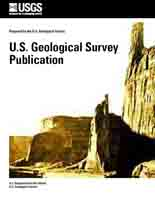Characterization of dissolved solids in water resources of agricultural lands near Manila, Utah, 2004-05
Links
- More information: USGS Index Page (html)
- Document: Report
- Version History: Revision History
- Download citation as: RIS | Dublin Core
Abstract
Agricultural lands near Manila, Utah, have been identified as contributing dissolved solids to Flaming Gorge Reservoir. Concentrations of dissolved solids in water resources of agricultural lands near Manila, Utah, ranged from 35 to 7,410 milligrams per liter. The dissolved-solids load in seeps and drains in the study area that discharge to Flaming Gorge Reservoir ranged from less than 0.1 to 113 tons per day. The most substantial source of dissolved solids discharging from the study area to the reservoir was Birch Spring Draw. The mean daily dissolved-solids load near the mouth of Birch Spring Draw was 65 tons per day.
The estimated annual dissolved-solids load imported to the study area by Sheep Creek and Peoples Canals is 1,330 and 13,200 tons, respectively. Daily dissolved-solid loads discharging to the reservoir from the study area, less the amount of dissolved solids imported by canals, for the period July 1, 2004, to June 30, 2005, ranged from 72 to 241 tons per day with a mean of 110 tons per day. The estimated annual dissolved-solids load discharging to the reservoir from the study area, less the amount of dissolved solids imported by canals, for the same period was 40,200 tons. Of this 40,200 tons of dissolved solids, about 9,000 tons may be from a regional source that is not associated with agricultural activities. The salt-loading factor is 3,670 milligrams per liter or about 5.0 tons of dissolved solids per acre-foot of deep percolation in Lucerne Valley and 1,620 milligrams per liter or 2.2 tons per acre-foot in South Valley.
The variation of δ87Sr with strontium concentration indicates some general patterns that help to define a conceptual model of the processes affecting the concentration of strontium and the δ87Sr isotopic ratio in area waters. As excess irrigation water percolates through soils derived from Mancos Shale, the δ87Sr isotopic ratio (0.21 to 0.69 permil) approaches one that is typical of deep percolation from irrigation on Mancos Shale. The boron concentration and δ11B value for the water sample from Antelope Wash, being distinctly different from water samples from other sites, is evidence that water in Antelope Wash may contain a substantial component of regional ground-water flow.
Suggested Citation
Gerner, S.J., Spangler, L., Kimball, B.A., Naftz, D.L., 2006, Characterization of dissolved solids in water resources of agricultural lands near Manila, Utah, 2004-05 (Version 2.0, Revised June 2007): U.S. Geological Survey Scientific Investigations Report 2006-5211, vi, 36 p., https://doi.org/10.3133/sir20065211.
ISSN: 2328-0328 (online)
Study Area
| Publication type | Report |
|---|---|
| Publication Subtype | USGS Numbered Series |
| Title | Characterization of dissolved solids in water resources of agricultural lands near Manila, Utah, 2004-05 |
| Series title | Scientific Investigations Report |
| Series number | 2006-5211 |
| DOI | 10.3133/sir20065211 |
| Edition | Version 2.0, Revised June 2007 |
| Year Published | 2006 |
| Language | English |
| Publisher | U.S. Geological Survey |
| Publisher location | Reston, VA |
| Contributing office(s) | Utah Water Science Center |
| Description | vi, 36 p. |
| Time Range Start | 2004-07-01 |
| Time Range End | 2005-06-30 |
| Country | United States |
| State | Utah |
| City | Manila |
| Online Only (Y/N) | Y |


